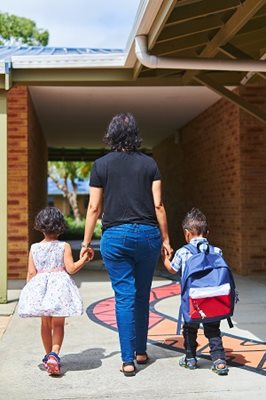 Engaging in local community groups and implementing activities in the home environment can help support your child’s transition into the school environment by fostering their development – language, emotion, communication, physical and social skills. Accessing community resources or participating with community groups is a good way for both you and your child to meet others, and build the skills for school readiness. You child’s interactions with family, friends, school or early learning centre can foster their development and confidence, ready for school.
Engaging in local community groups and implementing activities in the home environment can help support your child’s transition into the school environment by fostering their development – language, emotion, communication, physical and social skills. Accessing community resources or participating with community groups is a good way for both you and your child to meet others, and build the skills for school readiness. You child’s interactions with family, friends, school or early learning centre can foster their development and confidence, ready for school.
Knowing what resources and facilities are available in your area, can be difficult to identify. The Rockingham area offers age appropriate facilities and activities to support your child, this includes:
- playgroups
- parenting workshops
- early learning centres
- toy library
- libraries
- playgrounds
- parks
- child and parent centres.
Early Learning Educators may positively assist in your child’s transition. If you are uncertain on how they can support you, please ask your child’s educator or centre director. An early learning centre can support your child’s transition by working alongside you to develop their necessary skills for school. You may also like to reach out to your local primary school to see what transition into kindy program they offer or ask during the enrolment period.
The Early Years Learning Framework is the curriculum that Early Childhood Centres follow when structuring developmental activities for your child. Early childhood coordinators will document their learning through daily journals and will include details of what the child did during the day. This is done via an online platform, so can be easily accessed by parents and guardians. With parent permission, this information can be shared with their kindergarten teachers so that teachers can review the child’s learning before they even step into the classroom – this can go as far back as three to four years. Developmental summaries, which are completed by early learning coordinators every six months, can also be shared with both parents and teachers. These summaries cover skills the child has mastered, in addition to those that they are still developing, as well as other holistic comments, such as their social and emotional progress.
Early Learning Centres can also set up meetings with parents to discuss their child’s development. This is a great opportunity to discuss any extra support that your child may need as they transition into kindergarten, including suggestions for therapies, extracurricular activities or community groups.
Even if you are not yet engaged with the local community, you still have time. There are also activities that you may like to implement within the home environment to support your child’s development and school readiness. Below are a few activity ideas and tips that you can do at home to support your child’s development:
- reading story books together
- cooking healthy meals and snacks (including measuring, counting and naming ingredients)
- play outside or go on a nature walk together
- role play and dress ups including puppet play
- messy play (collage, playdough, paints, water or mud)
- sing songs or dance to music
- stacking and building games.
Find out more about services and activities available within the Rockingham area.